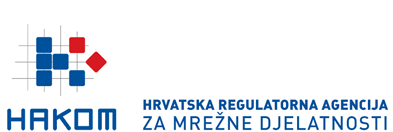Agreements on Coordination of Broadband Systems signed (UMTS/LTE/WiMAX)NEWSAgreements on coordination of broadband systems (UMTS/LTE/WiMAX) have been signed at a multilateral meeting held in Budapest. These agreements ensure additional regulation of the use of LTE systems in border areas.
ZAGREB, 05 June 2014 – A multilateral meeting between representatives of Austria, Hungary, Serbia, Slovakia, Slovenia and Croatia was held on 27 and 28 May.
These agreements additionally regulate the use of LTE systems in border areas, thus enabling more efficient use and simpler planning of the spectrum.Agreements on coordination of broadband systems (UMTS/LTE/WiMAX) in frequency bands 880 – 915/925 – 960 MHz i 1710 – 1785/1805 – 1880 MHz were agreed upon and signed at this meeting, which was attended by HAKOM’s representatives. These agreements were based on European decisions and recommendations and on the existing Agreement on the Coordination of IMT/UMTS Systems in the GMS bands. The agreements are available at HAKOM’s website: default.aspx?id=594 # # #
For additional information please contact:
Croatian Post and Electronic Communications Agency (HAKOM) Roberta Frangeša Mihanovića 9 10110 Zagreb, Croatia Tel. + 385 (0)1 700 70 07 Fax + 385 (0)1 700 70 70 Media inquiries can be submitted online using HAKOM’s official website: https://www.hakom.hr Registration required. ABOUT HAKOM:
HAKOM (www.hakom.hr) - Croatian Post and Electronic Communications Agency – ensures preconditions for a fair market competition, stable growth and environment for innovations in the electronic communications and postal services market. HAKOM protects users’ interests and the possibility of choice among various communications and postal services at affordable prices, defines sustainable competitive conditions for operators and service providers under fair conditions for return on investment, and provides support to economic growth, public services and the quality of life in the Republic of Croatia by using modern technologies. HAKOM’ strategic goals are: to promote regulation of the electronic communications and postal services market, to support growth of investments and innovations in the electronic communications and postal services market, to provide efficient use of limited resources, to accelerate the growth of broadband products and services, to provide affordable offers of communications and postal services, to provide protection and informing of users, to build an efficient and comprehensive information system, to define and implement efficient processes, and to acquire multi-disciplinary competencies in market regulation.
|
 |
|
|